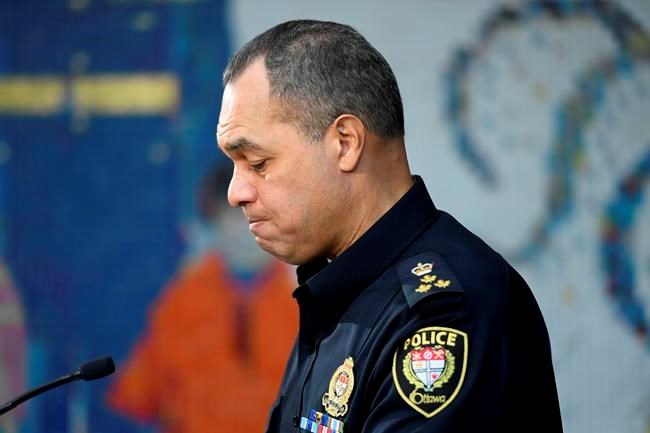Ottawa's police chief abruptly resigned Tuesday, while the Mounties and Ontario Provincial Police worked closely with the local force on a plan to end a chaotic antigovernment protest paralyzing the downtown core.
Ottawa Coun. Diane Deans, chair of the police services board, said in a written statement Tuesday that the "priority is to ensure a plan is put in place to bring about a peaceful end put to the occupation of our city, as expeditiously as possible."
She said the board and police Chief Peter Sloly had "reached a mutually agreed upon separation," thanked him for his service and said there would be no further comment because "this is a labour relations matter."
Steve Bell, the deputy police chief, becomes interim chief of the force, which is under intense pressure to do more to evict the protesters and their large trucks.
Earlier Tuesday, Public Safety Minister Marco Mendicino pointed to an integrated command centre set up over the weekend that so that the RCMP and provincial officers could work with the Ottawa police to respond to more demonstrators flowing into Canada's capital city.
Mendicino said the federal government is focused on ensuring the Ottawa police, as well as the RCMP and OPP, have all the tools necessary to restore order in the city.
"I know that they're working day and night to be sure that there is an operation that will be put into effect to restore public order," Mendicino said.
"It isn't easy. The illegal blockade has now become entrenched in the downtown core over the last three weeks."
Authorities are figuring out how best to use new powers — granted through the Emergencies Act, invoked Monday by Prime Minister Justin Trudeau — to help remove scores of protest trucks clogging the city's downtown.
The Ottawa police have been criticized for their response to the protest that has sparked a highly critical backlash from residents fed up with what many call an occupation.
Some protesters have harassed residents for wearing masks, flown Nazi and Confederate flags and honked their truck horns incessantly, though an injunction has helped quell the noise to some extent.
Many Ottawa residents and city councillors have expressed dismay at the local police force's seeming reluctance to enforce laws and maintain order downtown.
Officers have been frustrated by the lack of direction as well, said Ottawa Police Association president Matt Skof.
He said there were long-standing personality conflicts between the chief and his membership, but he believes that has little to do with the police response to the demonstration.
He said the middle of the conflict is not the time to point the finger about who is responsible for how the demonstration has played out but, when that time comes, the police board should also take responsibility.
"There is a vacuum of leadership," Skof said in response to Sloly's departure. "When there's an instability presented to them, members will have feelings of anxiousness."
Deans said during a police services board meeting Tuesday that last week the Ottawa force sent a clear message to the occupiers to expect a strong police response to illegal activity.
On the weekend, however, there were more street parties and a stage with a big screen as well as a sound system, hot tub and outdoor gym, Deans said.
"Today we have more trucks lined up on Parliament Hill than we had yesterday. Like other residents in Ottawa, I have watched in disbelief as this carnival of chaos has been allowed to continue," she added.
"While I appreciate that resource constraints have been a big limitation. It's both puzzling and frustrating that the (Ottawa police have) been unable to do more with the current resources."
Bell acknowledged the "tremendous stress" on the community, telling the meeting a plan was being refined to conclude the lengthy protest, though he declined to provide details in a public forum.
"I believe we now have the resources and partners to bring a safe end to this occupation," he said.
"Everybody wants the same thing: these people need to leave."
Coun. Carol Anne Meehan expressed frustration at instances of friendly officers "yukking it up" with protesters on city streets.
Bell tried to assure her there is no place in the police service for officers who support illegal demonstrators.
Sloly became chief of the Ottawa Police Service in 2019 after previously serving on the Toronto force for decades, including as deputy chief.
In a statement, Sloly said he was stepping down with a heavy heart, adding he had done everything possible to keep Ottawa safe and "put an end to this unprecedented and unforeseeable crisis."
Ottawa Mayor Jim Watson said he supported the police board's decision to accept Sloly's resignation.
It had become clear that many members of the board, city council and the general public "were not satisfied with the response of the police in bringing the occupation to an end," Watson said.
A city council meeting slated for Tuesday was bumped to Wednesday to allow local politicians to receive a more comprehensive update.
In addition, the city said, the federal move to invoke the Emergencies Act requires more work and analysis to provide council and the public with a better understanding of the tools now available.
On Monday, upon announcing use of the emergencies law, Trudeau said that despite the best efforts of police, it's clear there are "serious challenges" to officers' ability to enforce the law.
Declaring a public order emergency allows authorities to zero in on the crowdfunding of protests, ensure services such as towing are available and have the RCMP enforce municipal bylaws.
This report by The Canadian Press was first published Feb. 15, 2022.
— With files from Laura Osman
The Canadian Press
Note to readers: This is a corrected story. A previous version said the RCMP and the Ontario Provincial Police had taken control of enforcement in Ottawa.



